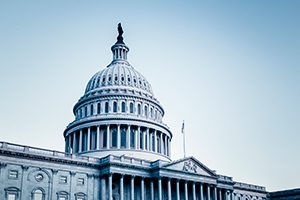Labor and Employment Policy Updates — October 2022
 As the 2022 midterm election nears, Congress has turned its focus to campaigning and essentially halted legislative action until after the election. Despite the lack of activity from Congress, federal agencies have continued to push forward with anticipated regulatory actions in the labor and employment policy area. This blog post details some of the regulatory activity CUPA-HR is currently monitoring, as well as a stalled nomination for a top position at the Department of Labor (DOL).
As the 2022 midterm election nears, Congress has turned its focus to campaigning and essentially halted legislative action until after the election. Despite the lack of activity from Congress, federal agencies have continued to push forward with anticipated regulatory actions in the labor and employment policy area. This blog post details some of the regulatory activity CUPA-HR is currently monitoring, as well as a stalled nomination for a top position at the Department of Labor (DOL).
NLRB Joint Employer Rule
On September 7, the National Labor Relations Board (NLRB) issued a notice of proposed rulemaking (NPRM) on the joint employer standard. Generally speaking, the NPRM proposes to expand joint employer status to entities with indirect or reserved control over essential terms and conditions of employment.
The NPRM establishes joint employer status of two or more employers if they “share or co-determine those matters governing employees’ essential terms and conditions of employment,” such as wages, benefits and other compensation, work and scheduling, hiring and discharge, discipline, workplace health and safety, supervision, assignment and work rules. According to the NLRB’s press release, the Board “proposes to consider both direct evidence of control and evidence of reserved and/or indirect control over these essential terms and conditions of employment when analyzing joint-employer status.”
Comments in response to the proposal were originally due November 7, but after stakeholders requested an extension to the filing deadline the Board extended the comment period to December 7.
Independent Contractor Rule
On October 13, the DOL published an NPRM to rescind the current method for determining independent contractor status under the Fair Labor Standards Act. The current test finalized by the Trump administration in 2021 has two core factors of control and investment with three additional factors (integration, skill and permanency) that are relevant only if those core factors are in disagreement. The Biden rule proposes a return to a “totality-of-the-circumstances analysis” of multiple factors in an economic reality test, including the following six factors, which are equally weighted with no core provisions:
- The extent to which the work is integral to the employer’s business;
- The worker’s opportunity for profit or loss depending on managerial skill;
- The investments made by the worker and the employer;
- The worker’s use of skill and initiative;
- The permanency of the work relationship; and
- The degree of control exercised or retained by the employer control.
Comments in response to the NPRM are due November 28.
Jessica Looman Nomination
On September 13, the Senate Health, Education, Labor and Pensions (HELP) Committee held a hearing on the nomination of Jessica Looman to serve as Administrator of the DOL’s Wage and Hour Division (WHD). Looman was officially nominated for the position in July 2022, months after Biden’s previous nominee David Weil failed to receive 50 votes to clear the Senate floor and become the WHD Administrator.
Looman has not yet had a committee vote to move her nomination to a full Senate floor vote. It is unclear when a Senate HELP vote will take place, but is likely to come after the election in November. Regardless of the timing on a vote, Looman continues to carry out the WHD’s rulemaking agenda in her current role as the Principal Deputy Administrator.
CUPA-HR will keep members apprised of any updates relating to the rulemakings and nomination discussed above.


